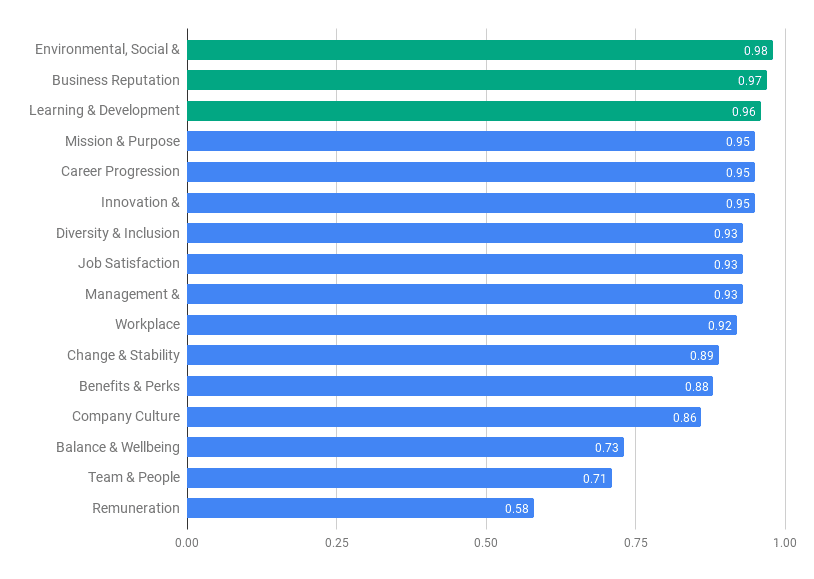
With the vast array of companies that candidates are exposed to, it’s crucial to stand out to attract and retain the best talent. This is where employer branding plays a pivotal role. According to The Chartered Institute of Personnel and Development (CIPD), a strong employer brand should couple an organization’s values and culture with its overall company brand. This would suggest that a company should showcase that it cares about its employees and that this ethos is echoed throughout different facets of the company. However, this can be in various areas of the companies, which is why we’ll be exploring three areas of employer brand that we’ve found to be the most salient in shaping a company’s reputation as an employer.
How we did it
We explored thousands of publicly obtainable pieces of discourse on user-generated platforms, including employer review sites, forums, social media, and other platforms. We collected all the English language-based comments we could find from 2018 to 2022. We then used sentiment analysis to translate this to an Employer Brand Index (EBI) score using our bespoke methodology. We produce a score for each of the sixteen attributes on a 0 to 10 scale, with 10 being the highest score. We next ranked the companies in our client universe by score and focused our analysis on the top 10 highest-scoring companies for this research.
A correlational analysis was conducted to identify which attributes were most strongly associated with a successful employer brand in these 10 companies. The three attributes most correlated to a strong employer reputation were Environment, Social & Governance, Business Reputation, and Learning & Development, as seen in the figure below. With a focus on these three key attributes, we delved into the qualitative data to uncover underlying themes and gain deeper insight into what factors contribute to their impact on a strong employer brand.
The bar chart illustrates the correlation coefficients of the relationships between each attribute score and the overall EBI score.

Environmental, Social & Governance
Environmental, Social & Governance is an increasingly important attribute to employees when evaluating potential employers. This attribute can be seen as how people feel about the company’s social, economic & environmental impact. Organizations that demonstrate a commitment to environmental sustainability, ethical business practices, and community engagement often experience an improvement in their perceived employer reputation (van Doorn, Verhoef & Risselada, 2020).

The vast majority of the positive commentary towards this attribute comes from social media platforms, with comments mentioning diversity, equality, sustainability, and awards associated with sustainability initiatives. Beyond social media commentary, employees express a shared belief that their companies prioritize fairness and inclusion, creating a strong sense of belonging. Companies that prioritize environmental and social impact often attract employees who share their values and are committed to making a positive impact.
Business Reputation
Business Reputation can be perceived as how people feel about the company’s industry and market reputation. It has been viewed as a necessary precursor of employer image and reputation because it is an indication of whether or not job seekers are aware of the organization (Collins & Kanar 2013). Candidates are more likely to apply to an organization that has a positive reputation and is perceived as a desirable place to work.

A large extent of the positive commentary toward business reputation comes from social media platforms, with comments mentioning brand awards, pride for their company, and company initiatives. The commentary from other platforms, such as job-review sites, mainly focused on describing the companies in a positive light. Key words frequently mentioned to describe company reputations are innovative, excellent, multinational, and world-leading. Therefore, it can be gathered that a positive business reputation can also help an organization stand out in a competitive job market and attract passive candidates who may not be actively seeking a new job.
Learning & Development
These high-scoring companies were particularly praised by their talent for their provision of professional development opportunities. Learning & Development can be viewed as how organizations that offer training, mentoring, apprenticeships, and career advancement opportunities attract and maintain high-quality job candidates who are looking for career growth and development. While the level of social media commentary is not as high as the two other attributes, around half of the positive commentary for this attribute came from social media platforms.

Many comments emphasized the importance of on-the-job learning, job-specific skill development, and receiving professional development certificates. Some employees also appreciated the opportunity to act as ambassadors for educational programs, fostering a sense of involvement in their organizations’ Learning & Development efforts. This is not surprising as it has been found that continuously seeking to provide employees with new skills and experiences through flexible learning programs and opportunities can play a significant role in attracting talent, particularly in this digital age of rapidly advancing technology (Mihalcea, 2017).
Actions to Achieve Strong Employer Reputation
The aforementioned attributes are long-term and more infrastructure-based aspects of employer branding to be worked on. As a result, here are some initial steps that companies can take to develop a strong employer brand:
- Define your company’s values and culture: A strong employer brand is built on a foundation of strong company values and culture. Define what your company stands for and what makes it unique. Communicate these values to employees and potential hires, and ensure they are reflected in every aspect of your company.
- Develop a clear employee value proposition (EVP): An EVP is the unique set of benefits and rewards employees receive in exchange for their work. This can include benefits, work-life balance, and particularly, opportunities for growth and development. Develop a clear EVP that communicates what makes your company a great place to work, and highlight it in all of your recruitment efforts.
- Use social media to promote your employer brand: Social media is a powerful tool for promoting your employer brand, which has been evidenced by the three attributes focused on. Platforms like LinkedIn, Instagram and Twitter can showcase a company’s culture, values, and employee experience. Spotlighting appropriate employee content that showcases your company in a positive light.
- Monitor and manage your reputation: In today’s digital age, it’s critical to monitor and manage your company’s online reputation. Regularly check review sites like Glassdoor and respond to any negative reviews in a professional and constructive manner. Ensure that your company’s messaging and branding are consistent across all channels and that any negative feedback is addressed promptly.
- Focus on employee engagement: Engaged employees are more likely to be loyal and promote your company to others. Develop strategies to foster employee engagement, such as regular feedback sessions, recognition and rewards programs, and opportunities for employee involvement in decision-making.
Conclusion
Ultimately, developing a strong employer brand is essential for attracting and retaining top talent in today’s competitive job market. By spotlighting the work done around sustainability and social initiatives, empowering a strong business reputation, and providing extensive learning opportunities, companies can build a strong employer brand that sets them apart from competitors and positions them as an employer of choice.
Rumesha Wisidagama is a Lead Analyst at Link Humans. Get in touch now to understand how the Employer Brand Index can inform your employer reputation strategy.
- Tagged With:
- Employer brand index
- Employer Reputation
- ESG
- Research
- Rumesha Wisidagama
STAY CONNECTED.
DATA-DRIVEN EMPLOYER
BRAND INSIGHTS.
Our newsletter is exclusively curated by our CEO, Jörgen Sundberg, for leaders who make decisions about talent. Subscribe for updates on The Employer Branding Podcast, new articles, eBooks, research and events we’re working on.



